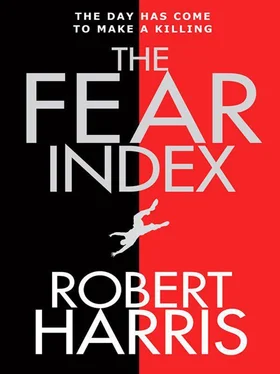Robert Harris - The Fear Index
Здесь есть возможность читать онлайн «Robert Harris - The Fear Index» весь текст электронной книги совершенно бесплатно (целиком полную версию без сокращений). В некоторых случаях можно слушать аудио, скачать через торрент в формате fb2 и присутствует краткое содержание. Жанр: Триллер, на английском языке. Описание произведения, (предисловие) а так же отзывы посетителей доступны на портале библиотеки ЛибКат.
- Название:The Fear Index
- Автор:
- Жанр:
- Год:неизвестен
- ISBN:нет данных
- Рейтинг книги:4 / 5. Голосов: 1
-
Избранное:Добавить в избранное
- Отзывы:
-
Ваша оценка:
- 80
- 1
- 2
- 3
- 4
- 5
The Fear Index: краткое содержание, описание и аннотация
Предлагаем к чтению аннотацию, описание, краткое содержание или предисловие (зависит от того, что написал сам автор книги «The Fear Index»). Если вы не нашли необходимую информацию о книге — напишите в комментариях, мы постараемся отыскать её.
The Fear Index — читать онлайн бесплатно полную книгу (весь текст) целиком
Ниже представлен текст книги, разбитый по страницам. Система сохранения места последней прочитанной страницы, позволяет с удобством читать онлайн бесплатно книгу «The Fear Index», без необходимости каждый раз заново искать на чём Вы остановились. Поставьте закладку, и сможете в любой момент перейти на страницу, на которой закончили чтение.
Интервал:
Закладка:
‘We’ll have our people here most of the day, and tonight we can keep an eye on the place – perhaps put a car in the road. But I have to say that generally we find that men in your position prefer to take precautions of their own.’
‘You mean hire bodyguards?’ Hoffmann grimaced. ‘I don’t want to live like that.’
‘Unfortunately, a house like this is always going to attract unwanted attention. And bankers are not especially popular these days, even in Switzerland.’ Leclerc looked around the room. ‘May I ask how much you paid for it?’
Normally Hoffmann would have told him to go to hell, but he didn’t have the strength. ‘Sixty million dollars.’
‘Oh my!’ Leclerc pursed his lips in pain. ‘You know, I can’t afford to live in Geneva any more. My wife and I have moved to a house just over the border in France, where things are cheaper. Of course it means I have to drive in every day, but there it is.’
From outside came the noise of a diesel engine. Gabrielle put her head around the door. ‘The ambulance is here. I’ll go and find you some clothes we can take with us.’
Hoffmann tried to rise. Leclerc came over to help him, but Hoffmann waved him away. The Swiss, he thought sourly: they pretend to welcome foreigners but really they resent us. Why should I care if he lives in France? He had to rock himself forward a couple of times before he had gained sufficient momentum to escape the sofa, but on his third attempt he managed it and stood swaying on the Aubusson carpet. The clamour in his head was making him feel nauseous again.
Leclerc said, ‘I do hope this unpleasant incident hasn’t put you off our beautiful country.’
Hoffmann wondered if he was joking, but the inspector’s face was perfectly straight.
‘Not at all.’
Together they went out into the hall, Hoffmann taking exaggerated care with each step, like a drunk who wishes to be thought sober. The house had become crowded with people from the emergency services. More gendarmes had arrived, along with two ambulance personnel, a man and a woman, wheeling a bed. Confronted by their heavy government-issue clothing, Hoffmann once again felt naked and vulnerable; an invalid. He was relieved to see Gabrielle coming down the stairs with his raincoat. Leclerc took it from her and draped it around Hoffmann’s shoulders.
By the front door, Hoffmann noticed a fire extinguisher, wrapped in a plastic bag. The mere sight of it gave him a twinge of pain. He said, ‘Are you going to put out an artist’s impression of this man?’
‘We might.’
‘Then now I think of it, there’s something you should see.’ It had come to him suddenly, with the force of a revelation. Ignoring the protests of the ambulance people that he should lie down, he turned and walked back along the hall to his study. The Bloomberg terminal on his desk was still switched on. Out of the corner of his eye he registered a red glow. Almost every price was down. The Far Eastern markets must be haemorrhaging. He switched on the light and searched along the shelf until he found The Expression of the Emotions in Man and Animals. His hands were trembling with excitement. He flicked through the pages.
‘There,’ he said, turning to show his discovery to Leclerc and Gabrielle. He tapped his finger on the page. ‘That’s the man who attacked me.’
It was the illustration for the emotion of terror – an old man, his eyes wide, his toothless mouth agape. Electric calipers were being applied to his facial muscles by the great French doctor Duchenne, an expert in galvanism, in order to stimulate the required expression.
Hoffmann could sense the others’ scepticism – no, worse: their dismay.
‘I’m sorry,’ said Leclerc, puzzled. ‘You’re telling us that this is the man who was in your house tonight?’
‘Oh, Alex,’ said Gabrielle.
‘Obviously I’m not saying it’s literally him – he’s been dead more than a century – I’m saying it looks like him.’ They were both staring at him intently. They believe I have gone mad, he thought. He took a breath. ‘Okay. Now this book,’ he explained carefully to Leclerc, ‘arrived yesterday without any explanation. I didn’t order it, right? I don’t know who sent it. Maybe it’s a coincidence. But you’ve got to agree it’s odd that a few hours after this arrives, a man – who actually looks as though he’s just stepped out of its pages – turns up to attack us.’ They were silent. ‘Anyway,’ he concluded, ‘all I’m saying is, if you want to make an artist’s impression of the guy, you should start with this.’
‘Thank you,’ said Leclerc. ‘I’ll bear that in mind.’
There was a pause.
‘Right,’ said Gabrielle brightly. ‘Let’s get you to the hospital.’
Leclerc saw them off from the front door.
The moon had disappeared behind the clouds. There was barely any light in the sky, even though there was only half an hour until dawn. The American physicist, with his bandaged head and his black raincoat and his thin pink ankles poking out beneath his expensive pyjamas, was helped into the back of the ambulance by one of the attendants. Since his gabbling remarks about the Victorian photograph, he had fallen silent; Leclerc thought he seemed embarrassed. He had taken the book with him. His wife followed, clutching a bag full of his clothes. They looked like a pair of refugees. The doors were banged shut and the ambulance pulled away, a patrol car behind it.
Leclerc watched until the two vehicles reached the curve of the drive leading to the main road. Brake lights briefly gleamed crimson and then they were gone.
He turned back into the house.
‘Big place for two people,’ muttered one of the gendarmes standing just inside the doorway.
Leclerc grunted. ‘Big place for ten people.’
He went on a solitary expedition to try to get a feel of what he was dealing with. Five, six – no, seven bedrooms upstairs, each with an en suite bathroom, none apparently ever used; the master bedroom huge, with a big dressing room next to it lined by mirrored doors and drawers; a plasma TV in the bathroom; his-and-hers basins; a space-age shower with a dozen nozzles. Across the landing, a gym, with an exercise bike, a rowing machine, a cross-trainer, weights, another big TV. No toys. No evidence of children anywhere, in fact, not even in the framed photographs scattered around, which were mostly of the Hoffmanns on expensive holidays – skiing, of course, and crewing a yacht, and holding hands on some veranda that seemed to be built on stilts above a coral lagoon of improbable blueness.
Leclerc went downstairs, imagining how it must have felt to be Hoffmann, an hour and a half earlier, descending to face the unknown. He skirted the bloodstains and passed through into the study. An entire wall was given over to books. He took down one at random and looked at the spine: Die Traumdeutung by Sigmund Freud. He opened it. Published Leipzig and Vienna, 1900. A first edition. He took down another. La psychologie des foules by Gustave le Bon. Paris, 1895. And another: L’homme machine by Julien Offray de La Mettrie. Leiden, 1747. Also a first edition. Leclerc knew little about rare books, but sufficient even so to appreciate that this must be a collection worth millions. No wonder there were so many smoke detectors dotted around the house. The subjects covered were mostly scientific: sociology, psychology, biology, anthropology – nothing anywhere about money.
He crossed over to the desk and sat down in Hoffmann’s antique captain’s chair. Occasionally the large screen in front of him rippled slightly as the shimmering expanse of figures changed: -1.06, -78, -4.03%, -$0.95. He could no more decipher it than he could read the Rosetta Stone. If only I could find the key, he thought, maybe I could be as rich as this fellow. His own investments, which he had been persuaded to make a few years back by some pimply ‘financial adviser’ in order to secure a comfortable old age, were now worth only half what he had paid for them. The way things were going, when he retired he would have to take a part-time job: head of security in a department store, maybe. He would work until he dropped – something not even his father and grandfather had had to do. Thirty years with the police and he couldn’t even afford to live in the town where he was born! And who was buying up all the expensive property? Money-launderers, many of them – the wives and daughters of presidents of the so-called ‘new democracies’, politicians from the central Asian republics, Russian oligarchs, Afghan warlords, arms-dealers – the real criminals of the world, in short, while he spent his time chasing teenage Algerian dope-peddlers hanging round the railway station. He made himself stand up and go into another room in order to take his mind off it.
Читать дальшеИнтервал:
Закладка:
Похожие книги на «The Fear Index»
Представляем Вашему вниманию похожие книги на «The Fear Index» списком для выбора. Мы отобрали схожую по названию и смыслу литературу в надежде предоставить читателям больше вариантов отыскать новые, интересные, ещё непрочитанные произведения.
Обсуждение, отзывы о книге «The Fear Index» и просто собственные мнения читателей. Оставьте ваши комментарии, напишите, что Вы думаете о произведении, его смысле или главных героях. Укажите что конкретно понравилось, а что нет, и почему Вы так считаете.










